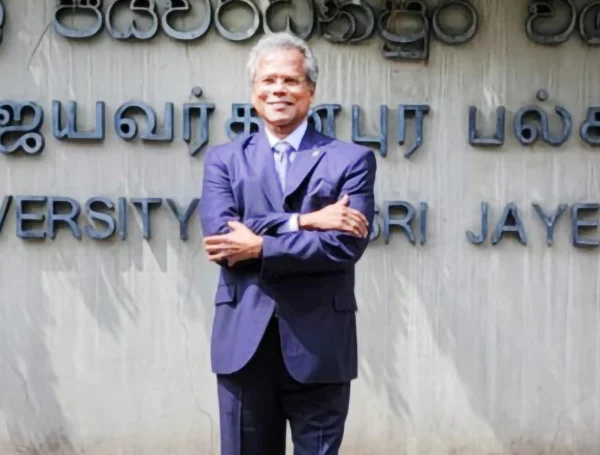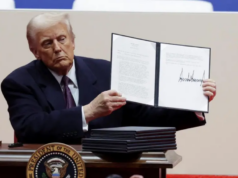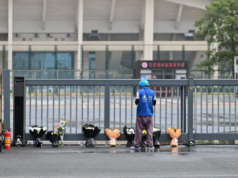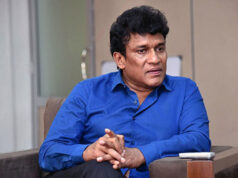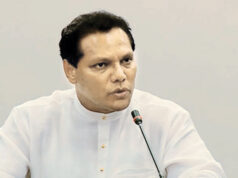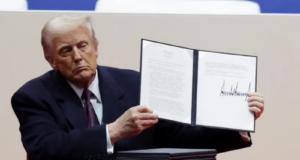By Ifham Nizam
Prof. Patrick Mendis, a Sri Lankan-born U.S. diplomat and presidential advisor to the U.S. Department of Defense issued a call to action for Sri Lanka’s leaders, urging them to adopt a pragmatic vision that balances historical wisdom with modern innovation.
Speaking on the topic, `The Power of Geopolitics and Its Implications for Sri Lanka’s National Development’, at a seminar organized by the National Chamber of Commerce last Friday, he said: “Commerce and connectivity have always been the lifeblood of nations. Sri Lanka must harness its strategic position and unique assets to chart a path of sustainable growth and prosperity.”
Mendis provided to the audience at the National Chamber Auditorium deep insights into how global political dynamics shape Sri Lanka’s economic and strategic future.
Drawing from his extensive experience across over 140 countries, Mendis highlighted key opportunities and challenges facing the nation. The event served as a vital platform for engaging discussions among policymakers, academics and industry leaders.
Professor Mendis of the University of Warsaw drew connections between history, trade, and modern geopolitics. His analysis highlighted how nations leverage their geographic and economic strengths to navigate global power dynamics. He outlined the opportunities and challenges for Sri Lanka amidst the shifting tides of international trade and diplomacy.
Opening with a historical lens, Mendis emphasized the role of commerce in shaping global alliances. Quoting Thomas Jefferson, he reiterated the timeless motto: “Commerce with all nations, alliance with none.” This principle, rooted in America’s founding vision, underscores the idea that peaceful trade can serve as a cornerstone for national prosperity. Jefferson’s vision for “practicable water communication across the continent for commerce” resonates even today as countries explore trade routes that minimize conflict while maximizing economic benefits.
Mendis also reflected on historical instances of Sri Lanka’s strategic connectivity. From King Bhatika Abhaya’s diplomatic exchanges with Rome and China in the Anuradhapura Kingdom to the maritime strategies of Parakramabahu I during the Polonnaruwa era, Sri Lanka has long been a hub for trade and cultural exchange. Such historical precedents underscore the island’s potential as a pivotal player in contemporary global trade.
Transitioning to modern geopolitics, Mendis focused on China’s Belt and Road Initiative (BRI). He described it as a transformative project aimed at fostering “a peaceful world built on trade.” By connecting Asia, Europe, and Africa through infrastructure investments, China seeks to rejuvenate the historical Silk Road and assert its economic dominance. For Sri Lanka, this presents both opportunities and challenges.
Sri Lanka’s strategic position in the Indian Ocean has made it a critical node in China’s maritime ambitions. Mendis referred to Sri Lanka as China’s “unsinkable aircraft carrier,” highlighting major investments like the Hambantota Port and Colombo Port City. While these projects promise economic growth, they also raise concerns about sovereignty and debt dependency.
Mendis likened China’s approach to a modern “MIDLIFE Strategy,” where military, intelligence, diplomacy, legal, identity, financial, and economic tools are employed to win battles without war. For example, Chinese survey missions in the Indian Ocean, ostensibly for fiber-optic cable laying and resource mapping, underline its dual-use strategy, blending commercial and strategic interests.
In the face of growing U.S.-China competition, Professor Mendis urged Sri Lanka to adopt a pragmatic and balanced approach. He discussed the implications of key U.S.-India agreements, including the General Security of Military Information Agreement (GSOMIA) and the Basic Exchange and Cooperation Agreement (BECA). These alignments, aimed at enhancing defense cooperation, have significant implications for the Indo-Pacific and Sri Lanka’s positioning.
Quoting Winston Churchill, Mendis reminded the audience: “We have no lasting friends, no lasting enemies, only lasting interests.” He emphasized that Sri Lanka must prioritize its national interests over allegiances, ensuring sustainable development while avoiding entanglements in power rivalries.
Mendis urged businesses to focus on sectors where Sri Lanka holds a comparative advantage, such as tourism, agriculture, and technology. By capitalizing on its rich cultural heritage and skilled workforce, the nation can attract investments that align with sustainable development goals.

